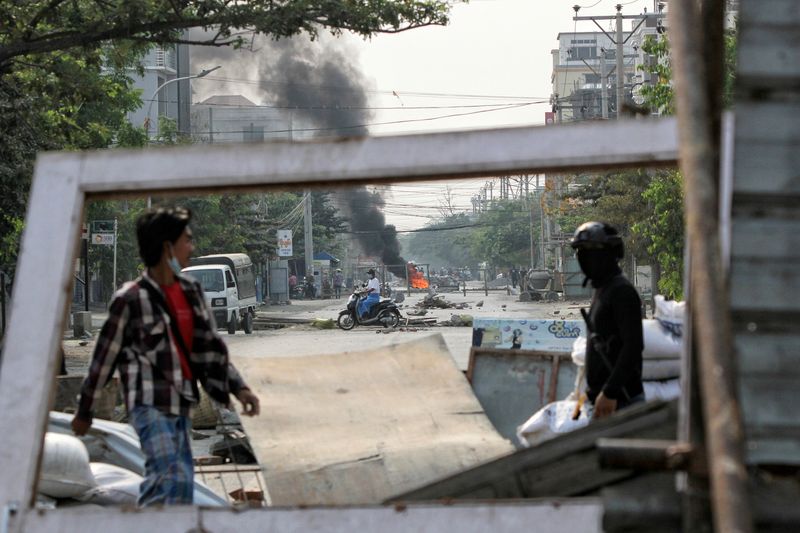(Reuters) - Myanmar's military accused anti-junta protesters of arson and violence as Western countries imposed more sanctions on individuals and groups linked to last month's coup and the ensuing bloody crackdown on dissent.
Junta spokesman Zaw Min Tun said 164 protesters had been killed in the violence and expressed sadness at the deaths.
"They are also our citizens," he told a news conference in the capital Naypyitaw on Tuesday, adding that the military would use the least force possible to quell violence.
The Assistance Association for Political Prisoners (AAPP) activist group says at least 261 people have been killed in the brutal crackdown by security forces that has left the Southeast Asian nation in turmoil.
Three people including a teenage boy were killed in unrest on Monday in Myanmar's second city, Mandalay, witnesses and news reports said.
The junta has tried to justify the coup by saying a Nov. 8 election won by Aung San Suu Kyi's National League for Democracy (NLD) was fraudulent - an accusation the electoral commission rejected. Military leaders have promised a new election but have not set a date and have declared a state of emergency.
Zaw Min Tun blamed protesters for violence and arson and said nine members of the security forces had been killed.
"Can we call these peaceful protesters?" he said, while showing a video of factories on fire. "Which country or organisation would regard this violence as peaceful?"
He said strikes and hospitals not fully operating had caused deaths, including from COVID-19, calling them "undutiful and unethical".
The spokesman also accused media of "fake news" and fanning unrest and said reporters could be prosecuted if they were in contact with the CRPH, as the remnants of Suu Kyi's government is known locally. The military has declared the CRPH an illegal organisation and said membership is punishable by death.
In the over three hour news conference, the spokesman also said the military respected the media and although reporting protests was allowed, leading them was a crime.
Zaw Min Tun gave granular details or how the NLD had created hundreds or even thousands of extra ballots in numerous townships by inventing voters, including in Suu Kyi's own constituency. Videos of people saying they were paid by NLD representatives were shown at the news conference.
Also shown was video testimony of former Yangon chief minister Phyo Min Thein saying he visited Suu Kyi multiple times and gave her money "whenever needed".
Suu Kyi, who won the Nobel Peace Prize for her campaign to bring democratic civilian rule to Myanmar, has been in detention since the coup. Her lawyer says charges against her are trumped up.
'UNBEARABLE EXTENT'
The European Union and the United States imposed sanctions on Monday against individuals involved in the coup and the repression of the demonstrators.
The EU sanctions were the bloc's most significant response since the overthrow of Suu Kyi's elected government on Feb. 1.
The 11 people it targeted included General Min Aung Hlaing, the commander-in-chief of the Myanmar military and head of the junta that has taken power.
The EU already has an arms embargo on Myanmar and has targeted some senior military officials since 2018.
German Foreign Minister Heiko Maas told reporters before the meeting that the military repression "has reached an unbearable extent".
Washington had already sanctioned Min Aung Hlaing and the measures announced on Monday expanded the list.
There was no immediate response from the junta, which has shown no sign so far of being swayed by international condemnation of its actions.
Myanmar's neighbours are also speaking out against the violence, which is rare for countries in the region.
"We believe violence against unarmed civilians is inexcusable," Singapore Foreign Minister Vivian Balakrishnan said in Kuala Lumpur after talks with his Malaysian counterpart.
"We still believe there should be no external interference in the domestic affairs of a country, but to the maximum extent possible...we stand ready to do our best to support the people of Myanmar who in fact deserve so much better in the future."

The junta said it is cooperating with five neighbouring countries - Bangladesh, China, India, Laos and Thailand - and values and respects their words, plus any countries that respect the stability of Myanmar.